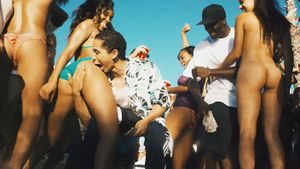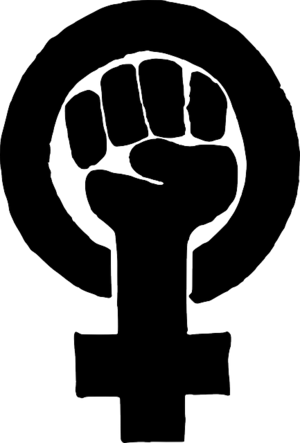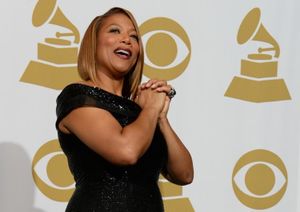GRSJ224/Feminist Movements and Misogyny in Rap
Since the late 1980s, misogyny has been found to be highly prevalent in the male-dominated rap music industry. However, within the past two decades, there has been a marked change in how misogyny is manifested in rap music. Despite theories that the prevalence of misogyny in rap music is in part in response to rising feminist movements[1], scholars have noted that some of this change can still be attributed to feminist movements such as Black Feminism and Hip-Hop Feminism[2]
Potentially as a result of such feminist movements, there has been a noted increase in active female rappers and an industry-wide shift away from the heavily explicit misogyny common in rap from before[2] [3]. The impact of these changes on youth and women are still being investigated by researchers.
Misogyny in Rap
For further reading, see Misogyny in Rap Muisc
Misogyny in rap music has been defined by Terri Adams and Douglas Fuller as the
- 'promotion, glamorization, support, humorization, justification, or normalization of oppressive ideas about women.'[4].
Starting from the late 1980s, overtly sexist lyrics that degrade, oppress, and objectify women have been common of the genre[4]. One study finds that 22% of mainstream rap songs between 1992 to 2000 have elements of misogyny[1]. Another finds that in rap music videos, the main characters who are shown to be independent free-thinkers were almost 80% more likely to be male characters whereas supporting characters in positions of servitude to the main characters were 66% more likely to be female[5]
There has been some debate as to the overall impact of misogyny in rap music on society. Some researchers believe the often violent oppression of women has led to increased crime rates and youth violence [6], while other researchers have found that women can still enjoy rap music despite the misogynous themes and that rap music facilitates greater peer connection[2]
Examples
Women or female-associated terms are often used by rappers as insults. For example, in 'Original Gangster' by Ice T, he insults other men by saying "All them pussies can be found/They talk a mean fight/But fight like hoes."[7] In this example, men who are weak are likened to women, thus perpetuating the stereotype of perceived female weakness.
Women themselves are also often directly referred to in graphic, violent, and sexual lyrics. One example from 'She Swallowed It' by N.W.A. says of a woman that "if you got a gang of niggas, the bitch would let you rape her."[8] This type of explicit lyric fosters the acceptance of abuse towards women.
Black Feminism
Background
For further reading, see Black Feminism
Black feminism has been defined as an intersectionality between race and gender as well as class and sexuality, that is primarily concerning black women.[3] One researcher notes that there was a recent increase in the prominence of Black Feminism that came along with the 'Solidarity' and 'Black Power' movements in 2014 [3]. African American women, who felt that they belonged to neither the female 'Solidarity' group or the 'Black Power' group, used the hashtags "#SolidarityIsForWhiteWomen" and "BlackPowerIsForBlackMen" to raise awareness for their issues. [3] Women who belonged in this group saw Black feminism as a movement that they could take ownership of.
Impact on Misogyny in Rap
Black feminism shares overlap with hip-hop feminism but also leaves its own distinct impact on misogyny in rap [2]. Some major impacts include the increased prevalence of African American female artists within the rap industry and the enriched dialogue focusing on female African American issues. Female artists have sometimes opted to directly challenge the status quo in rap while at other times choose to focus on promoting a dialogue to understand the various issues [2]. Ultimately, black feminism has allowed African American women an unique space to focus on important issues to them, such as sexism and racism.[3]
There are also artists who can be considered part of the Black feminist movement but conformed to existing themes such as sexist slang or misogynistic views. However, scholars have 'defended' female artists who chose to follow this second trend, noting that it was very difficult for women to gain entry into the rap industry, and conformation to existing practices was an important part in gaining acceptance and recognition.[1] Indeed, there has been a noted increase in female artists who are openly challenging the male dominated industry since these artists, perhaps indicating female artists have started to gain acceptance in rap.[1]
Examples
'Love is Blind' by Eve is heralded as one of the earliest examples of Black feminism.[1] The song condemns assault and abuse on women but also alludes to the strength of Black women. For example, Even asks:
- What kind of love from a nigga would black your eye
- What kind of love from a nigga every night make you cry
- What kind of love from a nigga make you wish he would die[9]
Through this song, Eve is directly challenging the commonly accepted abuse and mistreatment of women.
Lil Kim is an example of an artist who has conformed to some aspects of misogynistic rap culture but still advocates the feminist movement. While money and sex are key topics in her music, Lil Kim is able to demonstrate agency and power by using her appeal to manipulate men.[2] Thus, she is in control of her own body and has a role outside of being tied to men.
Hip-Hop Feminism
Background
For further reading, see Hip-Hop Feminism
Hip-Hop feminism is term coined by Joan Morgan in 1999, and it refers to a movement against the highly masculine and misogynistic culture in rap and to a broader extent, hip-hop.[10]. It has been classified as a 'generationally specific and historically contingent iteration of intersectionality and of critical race feminist theory' by some scholars.[3]
Hip-hop feminism has many similarities to Black feminism, as one critical issue for hip-hop feminists is the plight of Black women.[3] Noting that Black women often suffer from domestic violence, systemic oppression, and criminalization, hip-hop feminism has become a key force in articulating these struggles. Where it differs is that hip-hop feminism is considered more inclusive, as women of other races, transgendered people, or queer people of any kind often consider themselves part of the hip-hop feminist movement.[3]
Impact on Misogyny in Rap
With such close ties to Black feminism, hip-hop feminism also has had similar impacts on rap music. This includes a promotion of feminist issues, increased female engagement, and a gradual change in how women are portrayed in rap.[2] Hip-hop feminism faces many of the same challenges in female artists gaining recognition and acceptance while still advocating for the movement. [11]
Another key aspect of hip-hop feminism is the revolution of education. Within hip-hop based education, hip-hop feminism enforces a focus on those at the margins most likely to suffer discrimination and violence[3]. Some educators have used pedagogical methods based in hip-hop culture to teach students about bigger topics such as institutional racism or sexism[3]. In that sense, hip-hop feminism enables students to better critically engage with the issues they might face.
Examples
Missy Elliot and Queen Latifah are two artists who are hailed as early proponents of hip-hop feminism. Their lyrics contain themes common to this movement of engaging the rap industry on issues of sexism and racism. For example, in Queen Latifah's song 'U.N.I.T.Y.', she challenges male rappers' demeaning of women with the line, "Everytime I hear a brother call a girl a bitch or a ho/Trying to make a sister feel low/You know all of that gots to go."[12] Missy Elliot often features self-confidence in female rappers and makes the statement that women are just as capable of producing hits like men. For example, in her song 'WTF' she says, "I'm like kak-a-rak-a-rak-rak-a-rak-a-rak/Make a new track, make 'em fall on they crack."[13]
Further Discussion
Third-Wave Feminism
In reference to rap music, third-wave feminism is often associated with Black feminism and hip-hop feminism. One impact of this on rap music is that women who were previously cast as secondary characters or sex objects have now embraced sexual themes as a method of expressing individualism. Iannello, Kathleen. (1998). Third-Wave Feminism and Individualism: Promoting Equality or Reinforcing the Status Quo? https://rachelyon1.files.wordpress.com/2015/01/third-wave-feminism.pdf.</ref> For example, some female artists such as Nicki Minaj have used their bodies to empower women. Songs such as 'Anaconda' that feature scantily clad women have been touted as empowering curvier women.[14]
Fourth-Wave Feminism
Fourth-wave feminism has been described as a highly digital movement, with users often turning to digital media to voice their opinions.[15] However, the effects of this movement on rap has not been thoroughly explored yet and so it is unclear if fourth wave feminism has had an impact on rap music.
References
- ↑ 1.0 1.1 1.2 1.3 1.4 Weitzer, Ronald & Kubrin, Charis (2009). Misogyny in Rap Music: A Content Analysis of Prevalence and Meanings. Men and Masculinities, 12(1), 3-29. DOI:10.1177/1097184X08327696
- ↑ 2.0 2.1 2.2 2.3 2.4 2.5 2.6 Zichermann, Sandra. (2013). The Effects of Hip-Hop and Rap on Young Women in Academia. University of Toronto.
- ↑ 3.0 3.1 3.2 3.3 3.4 3.5 3.6 3.7 3.8 3.9 Lindsey, Treva. (2015). Let Me Blow Your Mind: Hip Hop Feminist Futures in Theory and Praxis. Urban Education, 50(1), 52-77. DOI: 10.1177/0042085914563184.
- ↑ 4.0 4.1 Adams, Terri & Fuller, Douglas. (2006). The Words Have Changed But the Ideology Remains the Same: Misogynistic Lyrics in Rap Music. Journal of Black Studies, 36(6), 938-957. http://www.jstor.org/stable/40034353.
- ↑ Dixon, Travis, Conrad, Kate, & Zhang, Yuanyuan. (2009). Controversial Rap Themes, Gender Portrayals and Skin Tone Distortion: A Content Analysis of Rap Music Videos. Journal of Broadcasting & Electronic Media. DOI: 10.1080/08838150802643795
- ↑ Herd, Deinse. (2009). Changing Images of Violence in Rap Music Lyrics: 1979-1997. Journal of Public Health Policy, 30(4), 395-306. http://www.jstor.org/stable/40542235.
- ↑ T, Ice. (2005). O.G. Original Ganster.
- ↑ N.W.A. (1991). She Swallowed It.
- ↑ Eve. (1999). Love is Blind.
- ↑ Morgan, Joan. (1999). That's the Joint: The Hip-Hop Studies Reader.
- ↑ Bennett, Patrick. (2014). Love, Drama, and Tears: Hip Hop Feminism, Blackness, and Love and Hip Hop Atlanta. Research Papers 530. http://opensiuc.lib.siu.edu/gs_rp/530.
- ↑ Latifah, Queen. 1993. U.N.I.T.Y.
- ↑ Elliot, Missy. (2015. WTF (Where They From?).
- ↑ Minaj, Nicki. (2014). Anaconda.
- ↑ Munro, Ealasaid (2013). Feminism: a fourth wave?. Political Studies Association, 4(2): 22–25. DOI:10.1111/2041-9066.12021.


